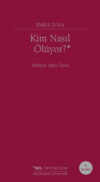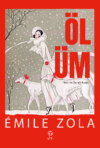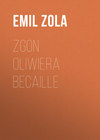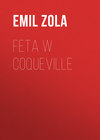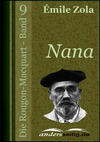Kitabı oku: «His Masterpiece», sayfa 10
He pointed to a tiny canvas before which he had stood absorbed, an absolutely childish picture, such as an urchin of four might have painted; a little cottage at the edge of a little road, with a little tree beside it, the whole out of drawing, and girt round with black lines. Not even a corkscrew imitation of smoke issuing from the roof was forgotten.
Claude made a nervous gesture, while Fagerolles repeated phlegmatically:
‘Very delicate, very delicate. But your picture, Gagniere, where is it?’
‘My picture, it is there.’
In fact, the picture he had sent happened to be very near the little masterpiece. It was a landscape of a pearly grey, a bit of the Seine banks, painted carefully, pretty in tone, though somewhat heavy, and perfectly ponderated without a sign of any revolutionary splash.
‘To think that they were idiotic enough to refuse that!’ said Claude, who had approached with an air of interest. But why, I ask you, why?’
‘Because it’s realistic,’ said Fagerolles, in so sharp a voice that one could not tell whether he was gibing at the jury or at the picture.
Meanwhile, Irma, of whom no one took any notice, was looking fixedly at Claude with the unconscious smile which the savage loutishness of that big fellow always brought to her lips. To think that he had not even cared to see her again. She found him so much altered since the last time she had seen him, so funny, and not at all prepossessing, with his hair standing on end, and his face wan and sallow, as if he had had a severe fever. Pained that he did not seem to notice her, she wanted to attract his attention, and touched his arm with a familiar gesture.
‘I say, isn’t that one of your friends over there, looking for you?’
It was Dubuche, whom she knew from having seen him on one occasion at the Cafe Baudequin. He was, with difficulty, elbowing his way through the crowd, and staring vaguely at the sea of heads around him. But all at once, when Claude was trying to attract his notice by dint of gesticulations, the other turned his back to bow very low to a party of three – the father short and fat, with a sanguine face; the mother very thin, of the colour of wax, and devoured by anemia; and the daughter so physically backward at eighteen, that she retained all the lank scragginess of childhood.
‘All right!’ muttered the painter. ‘There he’s caught now. What ugly acquaintances the brute has! Where can he have fished up such horrors?’
Gagniere quietly replied that he knew the strangers by sight. M. Margaillan was a great masonry contractor, already a millionaire five or six times over, and was making his fortune out of the great public works of Paris, running up whole boulevards on his own account. No doubt Dubuche had become acquainted with him through one of the architects he worked for.
However, Sandoz, compassionating the scragginess of the girl, whom he kept watching, judged her in one sentence.
‘Ah! the poor little flayed kitten. One feels sorry for her.’
‘Let them alone!’ exclaimed Claude, ferociously. ‘They have all the crimes of the middle classes stamped on their faces; they reek of scrofula and idiocy. It serves them right. But hallo! our runaway friend is making off with them. What grovellers architects are! Good riddance. He’ll have to look for us when he wants us!’
Dubuche, who had not seen his friends, had just offered his arm to the mother, and was going off, explaining the pictures with gestures typical of exaggerated politeness.
‘Well, let’s proceed then,’ said Fagerolles; and, addressing Gagniere, he asked, ‘Do you know where they have put Claude’s picture?’
‘I? no, I was looking for it – I am going with you.’
He accompanied them, forgetting Irma Becot against the ‘line.’ It was she who had wanted to visit the Salon on his arm, and he was so little used to promenading a woman about, that he had constantly lost her on the way, and was each time stupefied to find her again beside him, no longer knowing how or why they were thus together. She ran after them, and took his arm once more in order to follow Claude, who was already passing into another gallery with Fagerolles and Sandoz.
Then the five roamed about in Indian file, with their noses in the air, now separated by a sudden crush, now reunited by another, and ever carried along by the stream. An abomination of Chaine’s, a ‘Christ pardoning the Woman taken in Adultery,’ made them pause; it was a group of dry figures that looked as if cut out of wood, very bony of build, and seemingly painted with mud. But close by they admired a very fine study of a woman, seen from behind, with her head turned sideways. The whole show was a mixture of the best and the worst, all styles were mingled together, the drivellers of the historical school elbowed the young lunatics of realism, the pure simpletons were lumped together with those who bragged about their originality. A dead Jezabel, that seemed to have rotted in the cellars of the School of Arts, was exhibited near a lady in white, the very curious conception of a future great artist10; then a huge shepherd looking at the sea, a weak production, faced a little painting of some Spaniards playing at rackets, a dash of light of splendid intensity. Nothing execrable was wanting, neither military scenes full of little leaden soldiers, nor wan antiquity, nor the middle ages, smeared, as it were, with bitumen. But from amidst the incoherent ensemble, and especially from the landscapes, all of which were painted in a sincere, correct key, and also from the portraits, most of which were very interesting in respect to workmanship, there came a good fresh scent of youth, bravery and passion. If there were fewer bad pictures in the official Salon, the average there was assuredly more commonplace and mediocre. Here one found the smell of battle, of cheerful battle, given jauntily at daybreak, when the bugle sounds, and when one marches to meet the enemy with the certainty of beating him before sunset.
Claude, whose spirits had revived amidst that martial odour, grew animated and pugnacious as he listened to the laughter of the public. He looked as defiant, indeed, as if he had heard bullets whizzing past him. Sufficiently discreet at the entrance of the galleries, the laughter became more boisterous, more unrestrained, as they advanced. In the third room the women ceased concealing their smiles behind their handkerchiefs, while the men openly held their sides the better to ease themselves. It was the contagious hilarity of people who had come to amuse themselves, and who were growing gradually excited, bursting out at a mere trifle, diverted as much by the good things as by the bad. Folks laughed less before Chaine’s Christ than before the back view of the nude woman, who seemed to them very comical indeed. The ‘Lady in White’ also stupefied people and drew them together; folks nudged each other and went into hysterics almost; there was always a grinning group in front of it. Each canvas thus had its particular kind of success; people hailed each other from a distance to point out something funny, and witticisms flew from mouth to mouth; to such a degree indeed that, as Claude entered the fourth gallery, lashed into fury by the tempest of laughter that was raging there as well, he all but slapped the face of an old lady whose chuckles exasperated him.
‘What idiots!’ he said, turning towards his friends. ‘One feels inclined to throw a lot of masterpieces at their heads.’
Sandoz had become fiery also, and Fagerolles continued praising the most dreadful daubs, which only tended to increase the laughter, while Gagniere, at sea amid the hubbub, dragged on the delighted Irma, whose skirts somehow wound round the legs of all the men.
But of a sudden Jory stood before them. His fair handsome face absolutely beamed. He cut his way through the crowd, gesticulated, and exulted, as if over a personal victory. And the moment he perceived Claude, he shouted:
‘Here you are at last! I have been looking for you this hour. A success, old fellow, oh! a success – ’
‘What success?’
‘Why, the success of your picture. Come, I must show it you. You’ll see, it’s stunning.’
Claude grew pale. A great joy choked him, while he pretended to receive the news with composure. Bongrand’s words came back to him. He began to believe that he possessed genius.
‘Hallo, how are you?’ continued Jory, shaking hands with the others.
And, without more ado, he, Fagerolles and Gagniere surrounded Irma, who smiled on them in a good-natured way.
‘Perhaps you’ll tell us where the picture is,’ said Sandoz, impatiently. ‘Take us to it.’
Jory assumed the lead, followed by the band. They had to fight their way into the last gallery. But Claude, who brought up the rear, still heard the laughter that rose on the air, a swelling clamour, the roll of a tide near its full. And as he finally entered the room, he beheld a vast, swarming, closely packed crowd pressing eagerly in front of his picture. All the laughter arose, spread, and ended there. And it was his picture that was being laughed at.
‘Eh!’ repeated Jory, triumphantly, ‘there’s a success for you.’
Gagniere, intimidated, as ashamed as if he himself had been slapped, muttered: ‘Too much of a success – I should prefer something different.’
‘What a fool you are,’ replied Jory, in a burst of exalted conviction. ‘That’s what I call success. Does it matter a curse if they laugh? We have made our mark; to-morrow every paper will talk about us.’
‘The idiots,’ was all that Sandoz could gasp, choking with grief.
Fagerolles, disinterested and dignified like a family friend following a funeral procession, said nothing. Irma alone remained gay, thinking it all very funny. And, with a caressing gesture, she leant against the shoulder of the derided painter, and whispered softly in his ear: ‘Don’t fret, my boy. It’s all humbug, be merry all the same.’
But Claude did not stir. An icy chill had come over him. For a moment his heart had almost ceased to beat, so cruel had been the disappointment And with his eyes enlarged, attracted and fixed by a resistless force, he looked at his picture. He was surprised, and scarcely recognised it; it certainly was not such as it had seemed to be in his studio. It had grown yellow beneath the livid light of the linen screens; it seemed, moreover, to have become smaller; coarser and more laboured also; and whether it was the effect of the light in which it now hung, or the contrast of the works beside it, at all events he now at the first glance saw all its defects, after having remained blind to them, as it were, for months. With a few strokes of the brush he, in thought, altered the whole of it, deepened the distances, set a badly drawn limb right, and modified a tone. Decidedly, the gentleman in the velveteen jacket was worth nothing at all, he was altogether pasty and badly seated; the only really good bit of work about him was his hand. In the background the two little wrestlers – the fair and the dark one – had remained too sketchy, and lacked substance; they were amusing only to an artist’s eye. But he was pleased with the trees, with the sunny glade; and the nude woman – the woman lying on the grass appeared to him superior to his own powers, as if some one else had painted her, and as if he had never yet beheld her in such resplendency of life.
He turned to Sandoz, and said simply:
‘They do right to laugh; it’s incomplete. Never mind, the woman is all right! Bongrand was not hoaxing me.’
His friend wished to take him away, but he became obstinate, and drew nearer instead. Now that he had judged his work, he listened and looked at the crowd. The explosion continued – culminated in an ascending scale of mad laughter. No sooner had visitors crossed the threshold than he saw their jaws part, their eyes grow small, their entire faces expand; and he heard the tempestuous puffing of the fat men, the rusty grating jeers of the lean ones, amidst all the shrill, flute-like laughter of the women. Opposite him, against the hand-rails, some young fellows went into contortions, as if somebody had been tickling them. One lady had flung herself on a seat, stifling and trying to regain breath with her handkerchief over her mouth. Rumours of this picture, which was so very, very funny, must have been spreading, for there was a rush from the four corners of the Salon, bands of people arrived, jostling each other, and all eagerness to share the fun. ‘Where is it?’ ‘Over there.’ ‘Oh, what a joke!’ And the witticisms fell thicker than elsewhere. It was especially the subject that caused merriment; people failed to understand it, thought it insane, comical enough to make one ill with laughter. ‘You see the lady feels too hot, while the gentleman has put on his velveteen jacket for fear of catching cold.’ ‘Not at all; she is already blue; the gentleman has pulled her out of a pond, and he is resting at a distance, holding his nose.’ ‘I tell you it’s a young ladies’ school out for a ramble. Look at the two playing at leap-frog.’ ‘Hallo! washing day; the flesh is blue; the trees are blue; he’s dipped his picture in the blueing tub!’
Those who did not laugh flew into a rage: that bluish tinge, that novel rendering of light seemed an insult to them. Some old gentlemen shook their sticks. Was art to be outraged like this? One grave individual went away very wroth, saying to his wife that he did not like practical jokes. But another, a punctilious little man, having looked in the catalogue for the title of the work, in order to tell his daughter, read out the words, ‘In the Open Air,’ whereupon there came a formidable renewal of the clamour, hisses and shouts, and what not else besides. The title sped about; it was repeated, commented on. ‘In the Open Air! ah, yes, the open air, the nude woman in the air, everything in the air, tra la la laire.’ The affair was becoming a scandal. The crowd still increased. People’s faces grew red with congestion in the growing heat. Each had the stupidly gaping mouth of the ignoramus who judges painting, and between them they indulged in all the asinine ideas, all the preposterous reflections, all the stupid spiteful jeers that the sight of an original work can possibly elicit from bourgeois imbecility.
At that moment, as a last blow, Claude beheld Dubuche reappear, dragging the Margaillans along. As soon as he came in front of the picture, the architect, ill at ease, overtaken by cowardly shame, wished to quicken his pace and lead his party further on, pretending that he saw neither the canvas nor his friends. But the contractor had already drawn himself up on his short, squat legs, and was staring at the picture, and asking aloud in his thick hoarse voice:
‘I say, who’s the blockhead that painted this?’
That good-natured bluster, that cry of a millionaire parvenu resuming the average opinion of the assembly, increased the general merriment; and he, flattered by his success, and tickled by the strange style of the painting, started laughing in his turn, so sonorously that he could be heard above all the others. This was the hallelujah, a final outburst of the great organ of opinion.
‘Take my daughter away,’ whispered pale-faced Madame Margaillan in Dubuche’s ear.
He sprang forward and freed Regine, who had lowered her eyelids, from the crowd; displaying in doing so as much muscular energy as if it had been a question of saving the poor creature from imminent death. Then having taken leave of the Margaillans at the door, with a deal of handshaking and bows, he came towards his friends, and said straightway to Sandoz, Fagerolles, and Gagniere:
‘What would you have? It isn’t my fault – I warned him that the public would not understand him. It’s improper; yes, you may say what you like, it’s improper.’
‘They hissed Delacroix,’ broke in Sandoz, white with rage, and clenching his fists. ‘They hissed Courbet. Oh, the race of enemies! Oh, the born idiots!’
Gagniere, who now shared this artistic vindictiveness, grew angry at the recollection of his Sunday battles at the Pasdeloup Concerts in favour of real music.
‘And they hiss Wagner too; they are the same crew. I recognise them. You see that fat fellow over there – ’
Jory had to hold him back. The journalist for his part would rather have urged on the crowd. He kept on repeating that it was famous, that there was a hundred thousand francs’ worth of advertisements in it. And Irma, left to her own devices once more, went up to two of her friends, young Bourse men who were among the most persistent scoffers, but whom she began to indoctrinate, forcing them, as it were, into admiration, by rapping them on the knuckles.
Fagerolles, however, had not opened his lips. He kept on examining the picture, and glancing at the crowd. With his Parisian instinct and the elastic conscience of a skilful fellow, he at once fathomed the misunderstanding. He was already vaguely conscious of what was wanted for that style of painting to make the conquest of everybody – a little trickery perhaps, some attenuations, a different choice of subject, a milder method of execution. In the main, the influence that Claude had always had over him persisted in making itself felt; he remained imbued with it; it had set its stamp upon him for ever. Only he considered Claude to be an arch-idiot to have exhibited such a thing as that. Wasn’t it stupid to believe in the intelligence of the public? What was the meaning of that nude woman beside that gentleman who was fully dressed? And what did those two little wrestlers in the background mean? Yet the picture showed many of the qualities of a master. There wasn’t another bit of painting like it in the Salon! And he felt a great contempt for that artist, so admirably endowed, who through lack of tact made all Paris roar as if he had been the worst of daubers.
This contempt became so strong that he was unable to hide it. In a moment of irresistible frankness he exclaimed:
‘Look here, my dear fellow, it’s your own fault, you are too stupid.’
Claude, turning his eyes from the crowd, looked at him in silence. He had not winced, he had only turned pale amidst the laughter, and if his lips quivered it was merely with a slight nervous twitching; nobody knew him, it was his work alone that was being buffeted. Then for a moment he glanced again at his picture, and slowly inspected the other canvases in the gallery. And amidst the collapse of his illusions, the bitter agony of his pride, a breath of courage, a whiff of health and youth came to him from all that gaily-brave painting which rushed with such headlong passion to beat down classical conventionality. He was consoled and inspirited by it all; he felt no remorse nor contrition, but, on the contrary, was impelled to fight the popular taste still more. No doubt there was some clumsiness and some puerility of effort in his work, but on the other hand what a pretty general tone, what a play of light he had thrown into it, a silvery grey light, fine and diffuse, brightened by all the dancing sunbeams of the open air. It was as if a window had been suddenly opened amidst all the old bituminous cookery of art, amidst all the stewing sauces of tradition, and the sun came in and the walls smiled under that invasion of springtide. The light note of his picture, the bluish tinge that people had been railing at, flashed out among the other paintings also. Was this not the expected dawn, a new aurora rising on art? He perceived a critic who stopped without laughing, some celebrated painters who looked surprised and grave, while Papa Malgras, very dirty, went from picture to picture with the pout of a wary connoisseur, and finally stopped short in front of his canvas, motionless, absorbed. Then Claude turned round to Fagerolles, and surprised him by this tardy reply:
‘A fellow can only be an idiot according to his own lights, my dear chap, and it looks as if I am going to remain one. So much the better for you if you are clever!’
Fagerolles at once patted him on the shoulder, like a chum who had only been in fun, and Claude allowed Sandoz to take his arm. They led him off at last. The whole band left the Salon of the Rejected, deciding that they would pass on their way through the gallery of architecture; for a design for a museum by Dubuche had been accepted, and for some few minutes he had been fidgeting and begging them with so humble a look, that it seemed difficult indeed to deny him this satisfaction.
‘Ah!’ said Jory, jocularly, on entering the gallery, ‘what an ice-well! One can breathe here.’
They all took off their hats and wiped their foreheads, with a feeling of relief, as if they had reached some big shady trees after a long march in full sunlight. The gallery was empty. From the roof, shaded by a white linen screen, there fell a soft, even, rather sad light, which was reflected like quiescent water by the well-waxed, mirror-like floor. On the four walls, of a faded red, hung the plans and designs in large and small chases, edged with pale blue borders. Alone – absolutely alone – amidst this desert stood a very hirsute gentleman, who was lost in the contemplation of the plan of a charity home. Three ladies who appeared became frightened and fled across the gallery with hasty steps.
Dubuche was already showing and explaining his work to his comrades. It was only a drawing of a modest little museum gallery, which he had sent in with ambitious haste, contrary to custom and against the wishes of his master, who, nevertheless, had used his influence to have it accepted, thinking himself pledged to do so.
‘Is your museum intended for the accommodation of the paintings of the “open air” school?’ asked Fagerolles, very gravely.
Gagniere pretended to admire the plan, nodding his head, but thinking of something else; while Claude and Sandoz examined it with sincere interest.
‘Not bad, old boy,’ said the former. ‘The ornamentation is still bastardly traditional; but never mind; it will do.’
Jory, becoming impatient at last, cut him short.
‘Come along, let’s go, eh? I’m catching my death of cold here.’
The band resumed its march. The worst was that to make a short cut they had to go right through the official Salon, and they resigned themselves to doing so, notwithstanding the oath they had taken not to set foot in it, as a matter of protest. Cutting their way through the crowd, keeping rigidly erect, they followed the suite of galleries, casting indignant glances to right and left. There was none of the gay scandal of their Salon, full of fresh tones and an exaggeration of sunlight, here. One after the other came gilt frames full of shadows; black pretentious things, nude figures showing yellowish in a cellar-like light, the frippery of so-called classical art, historical, genre and landscape painting, all showing the same conventional black grease. The works reeked of uniform mediocrity, they were characterised by a muddy dinginess of tone, despite their primness – the primness of impoverished, degenerate blood. And the friends quickened their steps: they ran to escape from that reign of bitumen, condemning everything in one lump with their superb sectarian injustice, repeating that there was nothing in the place worth looking at – nothing, nothing at all!
At last they emerged from the galleries, and were going down into the garden when they met Mahoudeau and Chaine. The former threw himself into Claude’s arms.
‘Ah, my dear fellow, your picture; what artistic temperament it shows!’
The painter at once began to praise the ‘Vintaging Girl.’
‘And you, I say, you have thrown a nice big lump at their heads!’
But the sight of Chaine, to whom no one spoke about the ‘Woman taken in Adultery,’ and who went silently wandering around, awakened Claude’s compassion. He thought there was something very sad about that execrable painting, and the wasted life of that peasant who was a victim of middle-class admiration. He always gave him the delight of a little praise; so now he shook his hand cordially, exclaiming:
‘Your machine’s very good too. Ah, my fine fellow, draughtsmanship has no terrors for you!’
‘No, indeed,’ declared Chaine, who had grown purple with vanity under his black bushy beard.
He and Mahoudeau joined the band, and the latter asked the others whether they had seen Chambouvard’s ‘Sower.’ It was marvellous; the only piece of statuary worth looking at in the Salon. Thereupon they all followed him into the garden, which the crowd was now invading.
‘There,’ said Mahoudeau, stopping in the middle of the central path: ‘Chambouvard is standing just in front of his “Sower.”’
In fact, a portly man stood there, solidly planted on his fat legs, and admiring his handiwork. With his head sunk between his shoulders, he had the heavy, handsome features of a Hindu idol. He was said to be the son of a veterinary surgeon of the neighbourhood of Amiens. At forty-five he had already produced twenty masterpieces: statues all simplicity and life, flesh modern and palpitating, kneaded by a workman of genius, without any pretension to refinement; and all this was chance production, for he furnished work as a field bears harvest, good one day, bad the next, in absolute ignorance of what he created. He carried the lack of critical acumen to such a degree that he made no distinction between the most glorious offspring of his hands and the detestably grotesque figures which now and then he chanced to put together. Never troubled by nervous feverishness, never doubting, always solid and convinced, he had the pride of a god.
‘Wonderful, the “Sower”!’ whispered Claude. ‘What a figure! and what an attitude!’
Fagerolles, who had not looked at the statue, was highly amused by the great man, and the string of young, open-mouthed disciples whom as usual he dragged at his tail.
‘Just look at them, one would think they are taking the sacrament, ‘pon my word – and he himself, eh? What a fine brutish face he has!’
Isolated, and quite at his ease, amidst the general curiosity, Chambouvard stood there wondering, with the stupefied air of a man who is surprised at having produced such a masterpiece. He seemed to behold it for the first time, and was unable to get over his astonishment. Then an expression of delight gradually stole over his broad face, he nodded his head, and burst into soft, irresistible laughter, repeating a dozen times, ‘It’s comical, it’s really comical!’
His train of followers went into raptures, while he himself could find nothing more forcible to express how much he worshipped himself. All at once there was a slight stir. Bongrand, who had been walking about with his hands behind his back, glancing vaguely around him, had just stumbled on Chambouvard, and the public, drawing back, whispered, and watched the two celebrated artists shaking hands; the one short and of a sanguine temperament, the other tall and restless. Some expressions of good-fellowship were overheard. ‘Always fresh marvels.’ ‘Of course! And you, nothing this year?’ ‘No, nothing; I am resting, seeking – ’ ‘Come, you joker! There’s no need to seek, the thing comes by itself.’ ‘Good-bye.’ ‘Good-bye.’ And Chambouvard, followed by his court, was already moving slowly away among the crowd, with the glances of a king, who enjoys life, while Bongrand, who had recognised Claude and his friends, approached them with outstretched feverish hands, and called attention to the sculptor with a nervous jerk of the chin, saying, ‘There’s a fellow I envy! Ah! to be confident of always producing masterpieces!’
He complimented Mahoudeau on his ‘Vintaging Girl’; showed himself paternal to all of them, with that broad-minded good-nature of his, the free and easy manner of an old Bohemian of the romantic school, who had settled down and was decorated. Then, turning to Claude:
‘Well, what did I tell you? Did you see upstairs? You have become the chief of a school.’
‘Ah! yes,’ replied Claude. ‘They are giving it me nicely. You are the master of us all.’
But Bongrand made his usual gesture of vague suffering and went off, saying, ‘Hold your tongue! I am not even my own master.’
For a few moments longer the band wandered through the garden. They had gone back to look at the ‘Vintaging Girl,’ when Jory noticed that Gagniere no longer had Irma Becot on his arm. Gagniere was stupefied; where the deuce could he have lost her? But when Fagerolles had told him that she had gone off in the crowd with two gentlemen, he recovered his composure, and followed the others, lighter of heart now that he was relieved of that girl who had bewildered him.
People now only moved about with difficulty. All the seats were taken by storm; groups blocked up the paths, where the promenaders paused every now and then, flowing back around the successful bits of bronze and marble. From the crowded buffet there arose a loud buzzing, a clatter of saucers and spoons which mingled with the throb of life pervading the vast nave. The sparrows had flown up to the forest of iron girders again, and one could hear their sharp little chirps, the twittering with which they serenaded the setting sun, under the warm panes of the glass roof. The atmosphere, moreover, had become heavy, there was a damp greenhouse-like warmth; the air, stationary as it was, had an odour as of humus, freshly turned over. And rising above the garden throng, the din of the first-floor galleries, the tramping of feet on their iron-girdered flooring still rolled on with the clamour of a tempest beating against a cliff.
Claude, who had a keen perception of that rumbling storm, ended by hearing nothing else; it had been let loose and was howling in his ears. It was the merriment of the crowd whose jeers and laughter swept hurricane-like past his picture. With a weary gesture he exclaimed:
‘Come, what are we messing about here for? I sha’n’t take anything at the refreshment bar, it reeks of the Institute. Let’s go and have a glass of beer outside, eh?’
They all went out, with sinking legs and tired faces, expressive of contempt. Once outside, on finding themselves again face to face with healthy mother Nature in her springtide season, they breathed noisily with an air of delight. It had barely struck four o’clock, the slanting sun swept along the Champs Elysees and everything flared: the serried rows of carriages, like the fresh foliage of the trees, and the sheaf-like fountains which spouted up and whirled away in golden dust. With a sauntering step they went hesitatingly down the central avenue, and finally stranded in a little cafe, the Pavillon de la Concorde, on the left, just before reaching the Place. The place was so small that they sat down outside it at the edge of the footway, despite the chill which fell from a vault of leaves, already fully grown and gloomy. But beyond the four rows of chestnut-trees, beyond the belt of verdant shade, they could see the sunlit roadway of the main avenue where Paris passed before them as in a nimbus, the carriages with their wheels radiating like stars, the big yellow omnibuses, looking even more profusely gilded than triumphal chariots, the horsemen whose steeds seemed to raise clouds of sparks, and the foot passengers whom the light enveloped in splendour.

